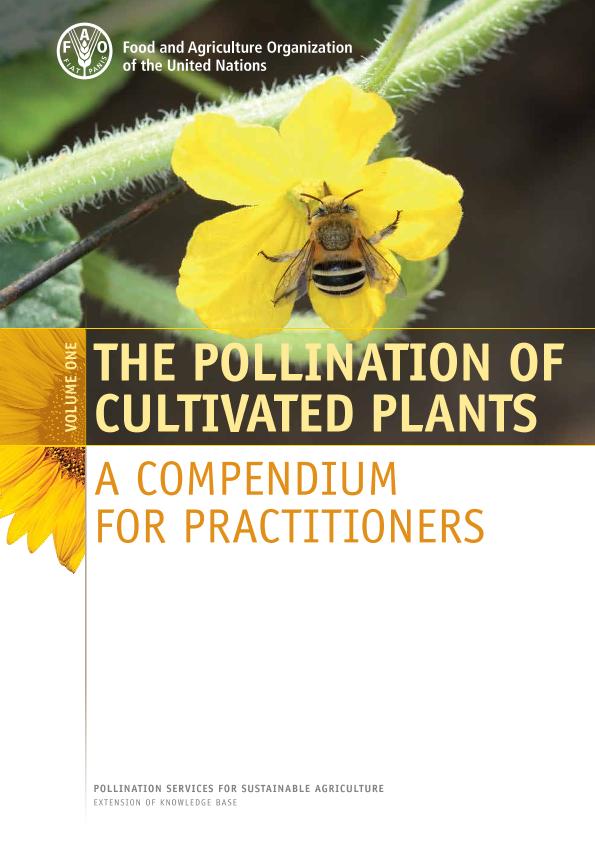Mostrar el registro sencillo del ítem
dc.contributor.author
Garibaldi, Lucas Alejandro

dc.contributor.author
Cunningham, S. A.
dc.contributor.author
Aizen, Marcelo Adrian

dc.contributor.author
Packer, L.
dc.contributor.author
Harder, Lawrence

dc.contributor.other
Roubik, David Ward
dc.date.available
2021-06-16T14:27:57Z
dc.date.issued
2018
dc.identifier.citation
Garibaldi, Lucas Alejandro; Cunningham, S. A.; Aizen, Marcelo Adrian; Packer, L.; Harder, Lawrence; The potential for insect pollinators to alleviate global pollination deficits and enhance yield of fruit and seed crops; Food and Agriculture Organization of the United Nations; 1; 2018; 35-53
dc.identifier.isbn
978-92-5-130512-6
dc.identifier.uri
http://hdl.handle.net/11336/134008
dc.description.abstract
Humanity faces amajor challenge as agricultural intensification and growth ofcultivated areas increase to satisfy greater demands from a humanpopulation of growing size and affluence. However, with long-term,sustainable agricultural practices, higher agricultural productiondoes not necessarily require further loss of biodiversity or majorenvironmental degradation. Crop yield (tonnes ha -1 ) is a key driverof farm profits, livelihoods and agricultural decisions, whichinfluence land use at both local and global scales. This chapterdiscussed how yield could be limited by pollen quantity and quality.Pollination deficit is the difference between realized yield andpotential achievedunder optimal pollen quantity and quality conditions. Pollinationdeficits can arise for crops because, unlike other limits, such asnutrients and pests, pollen delivery is not managed directly in mostagricultural systems. Consistent with these observations, globalpatterns of yield reveal that pollination deficits are common forcrops dependent on animal pollination.Pollination deficitsreduce the yield growth of pollinator-dependent crops and alsopromote thecultivation of alarger area to satisfy production demands. Indeed, planting ofpollinator-dependentcrops is expandingthree times faster than the managed honey bee population, potentiallyexacerbating chronic pollination deficits exhibited by many crops. Asa consequence, crop yield increasingly depends on pollinationservices provided by wild insects, which contribute significantly tofruit or seed set, regardless of crop origin (exotic or native) andlife history traits (herbaceous or woody, etc.). Honey beessupplement the role of wild insects but cannot replace them, so thatefforts to maximize pollination require the conservation orenhancement of all available pollinators. However, managed and wildpopulations of pollinators are declining in many agriculturallandscapes, and further introductions of alien species should bediscouraged because of their manifold environmental impacts. Thissituation strongly motivates conservation or restoration of naturaland semi-natural areas within agricultural landscapes.p { margin-bottom: 0.25cm; line-height: 120%; }
dc.format
application/pdf
dc.language.iso
eng
dc.publisher
Food and Agriculture Organization of the United Nations
dc.rights
info:eu-repo/semantics/openAccess
dc.rights.uri
https://creativecommons.org/licenses/by-nc-sa/2.5/ar/
dc.subject
POLLINATION
dc.subject
CROP YIELD
dc.subject
POLLINATOR
dc.subject
POLLEN
dc.subject.classification
Agricultura

dc.subject.classification
Agricultura, Silvicultura y Pesca

dc.subject.classification
CIENCIAS AGRÍCOLAS

dc.subject.classification
Conservación de la Biodiversidad

dc.subject.classification
Ciencias Biológicas

dc.subject.classification
CIENCIAS NATURALES Y EXACTAS

dc.subject.classification
Ecología

dc.subject.classification
Ciencias Biológicas

dc.subject.classification
CIENCIAS NATURALES Y EXACTAS

dc.title
The potential for insect pollinators to alleviate global pollination deficits and enhance yield of fruit and seed crops
dc.type
info:eu-repo/semantics/publishedVersion
dc.type
info:eu-repo/semantics/bookPart
dc.type
info:ar-repo/semantics/parte de libro
dc.date.updated
2020-02-19T20:00:36Z
dc.journal.volume
1
dc.journal.pagination
35-53
dc.journal.pais
Italia

dc.journal.ciudad
Roma
dc.description.fil
Fil: Garibaldi, Lucas Alejandro. Consejo Nacional de Investigaciones Científicas y Técnicas. Centro Científico Tecnológico Conicet - Patagonia Norte. Instituto de Investigaciones en Recursos Naturales, Agroecología y Desarrollo Rural. - Universidad Nacional de Rio Negro. Instituto de Investigaciones en Recursos Naturales, Agroecología y Desarrollo Rural; Argentina
dc.description.fil
Fil: Cunningham, S. A.. CSIRO Ecosystem Sciences; Australia
dc.description.fil
Fil: Aizen, Marcelo Adrian. Consejo Nacional de Investigaciones Científicas y Técnicas. Centro Científico Tecnológico Conicet - Patagonia Norte. Instituto de Investigaciones en Biodiversidad y Medioambiente. Universidad Nacional del Comahue. Centro Regional Universidad Bariloche. Instituto de Investigaciones en Biodiversidad y Medioambiente; Argentina. Universidad Nacional del Comahue. Centro Regional Universitario Bariloche. Laboratorio de Ecotono; Argentina
dc.description.fil
Fil: Packer, L.. York University; Canadá
dc.description.fil
Fil: Harder, Lawrence. University of Calgary; Canadá
dc.relation.alternativeid
info:eu-repo/semantics/altIdentifier/url/http://www.fao.org/3/i9201en/I9201EN.pdf
dc.relation.alternativeid
info:eu-repo/semantics/altIdentifier/url/http://www.fao.org/documents/card/es/c/I9201EN/
dc.conicet.paginas
324
dc.source.titulo
The pollination of cultivated plants: A compendium for practitioners
dc.conicet.nroedicion
2a.
Archivos asociados
